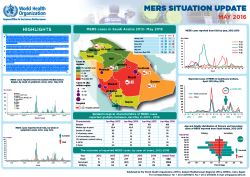 Situation update on Middle East respiratory syndrome July 2017At the end of July 2017, a total of 2045 laboratory-confirmed cases of Middle East respiratory syndrome coronavirus (MERS-CoV), including 733 deaths (case–fatality rate: 35.8%) were reported globally; the majority of these cases were reported from Saudi Arabia (1676 laboratory-confirmed cases, including 659 deaths with a case–fatality rate of 39.3%).
Situation update on Middle East respiratory syndrome July 2017At the end of July 2017, a total of 2045 laboratory-confirmed cases of Middle East respiratory syndrome coronavirus (MERS-CoV), including 733 deaths (case–fatality rate: 35.8%) were reported globally; the majority of these cases were reported from Saudi Arabia (1676 laboratory-confirmed cases, including 659 deaths with a case–fatality rate of 39.3%).- During the month of July 2017, 6 laboratory-confirmed cases were reported globally, including one case reported in UAE, with 3 deaths. No health-care associated transmission or hospital outbreak was reported during this month. No new cases were reported from the three simultaneous hospital outbreaks reported from three di erent hospitals in Riyadh city, Riyadh Region during the months of May and June 2017. The date of reporting of last laboratory-confirmed case from these clusters was 17 June 2017, and the interval period until the end of July 2017 is more than the double of the incubation period form MERS, we can say that these hospital outbreaks are over.
- The demographic and epidemiological characteristics of the cases reported in 2017 do not show any significant di erence compared with cases reported during the same period from 2012 to 2016. Owing to improved infection prevention and control practices in the hospitals, the number of hospital-acquired cases of MERS has dropped significantly in 2015 and in 2016 compared to previous years.
- The age group of those aged 50–59 years continues to be the group at highest risk for acquiring infection as primary cases. For secondary cases, it is the age group of 30–39 years who are mostly at risk. The number of deaths is higher in the age group of 50–59 years for primary cases and 70–79 years for secondary cases.
Search
{{#data.error.root_cause}}
{{/data.error}}
{{^data.error}}
{{#texts.summary}}
[{{{type}}}] {{{reason}}}
{{/data.error.root_cause}}{{texts.summary}} {{#options.result.rssIcon}} RSS {{/options.result.rssIcon}}
{{/texts.summary}} {{#data.hits.hits}}
{{#_source.featured}}
FEATURED
{{/_source.featured}}
{{#_source.showImage}}
{{#_source.image}}
{{/_source.image}}
{{/_source.showImage}}
{{/data.hits.hits}}
{{{_source.title}}} {{#_source.showPrice}} {{{_source.displayPrice}}} {{/_source.showPrice}}
{{#_source.showLink}} {{/_source.showLink}} {{#_source.showDate}}{{{_source.displayDate}}}
{{/_source.showDate}}{{{_source.description}}}
{{#_source.additionalInfo}}{{#_source.additionalFields}} {{#title}} {{{label}}}: {{{title}}} {{/title}} {{/_source.additionalFields}}
{{/_source.additionalInfo}}

